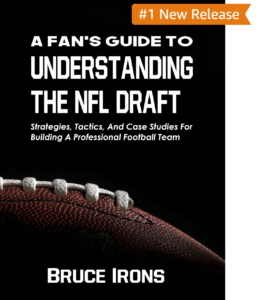![]() Stupid teams do stupid things all the time.
Stupid teams do stupid things all the time.
One of the stupidest things they do is lose all year, get a high pick, draft a great quarterback prospect, and then ruin his career early by rushing him into action too early.
Then in a few years, they do it all over again.
I know that fans are impatient and think that players walk into the NFL ready to play. But that’s not the case. Not even for top 5 picks.
Rookies don’t come into the league at their potential. Look around – guys get better in their second year and the best ones keep getting better after that.
Quarterback, most of all.
Why is that?
Lost of reasons.
Let’s start with the mental state of rookies.
These are kids. Forget how freakish their bodies are, they’re still kids. A lot of them can’t drink yet (legally), and they’ve been playing for free (unless they were in the SEC).
So, first things first, you have immature kids getting money for the first time ever. And it’s not just a little money.
They’re buying new cars, getting houses for their moms, buying brand name toilet paper, and generally just rocking their world while tons of hangers-on bother them for money.
Once the shock of all that wears off and they get down to business, they have a whole new world to explore and adapt to.
At work, they need to adapt to a pro style offense. Some people scoff and say “football is football” but that’s like comparing basic addition to quantum calculus and saying “math is math.” Pro football scheme are so much more complex than college schemes.
In college, coaches only have these guys for a few years. They don’t have time to develop them as players. They bring in athletes that need to play pretty much immediately. Their offenses are designed to be run by kids without a lot of studying – they need to be basic.
In the pros, coordinators spend years evolving their systems, depending on veteran players to build off their familiarity with the system. New offenses are installed over a two-to-three year period and continually evolve from there.
A wide receiver may be able to pick things up reasonably well the first year. He just needs to figure out his place in the offense, which routes to run and maybe which blocks he needs to pickup.
Quarterbacks are different. They need to learn every last detail about those systems from blocking schemes and blitz pickups to audible calls (which could have more than half a dozen variations on each play) to route concepts and on-the-fly variations that come off defensive adjustments, and they have to learn it all starting with zero working knowledge.
That takes time. More than a few months to master.
Players often over-think as rookies. They’re trying to process all this new information and scheme while they’re running full speed. IT takes a long time to figure out. Once they figure it out, they think less and move faster (this is when people say the game “slows down” for them because they’re processing it faster). But while they’re still figuring it out, they’re playing much slower and are far less effective – if they’re doing this on the field instead of on the bench, it can ruin their confidence (which is a big part of being an effective professional athlete) and could short-circuit their career. They need time to figure these things out.
During that time, they’re also getting their bodies used to pro level practices and diets, new regimens with more resources than they ever had access to before.
On top of it all, their bodies are absolutely tapped at this time. As a rookie, they’re coming off of a college season, moving right into draft training, then jumping to rookie camp and training camp. Their bodies are not ready to take live NFL action beatings and by the beginning of their rookie year, they are probably the most broken they’ve every been. Human bodies simply aren’t built for that type of ongoing rigor.
When a QB is talented enough, he can get by on raw skill in college, where he’s playing against kids fresh out of high school and ton of guys who will never even sniff a practice squad). College coaches, who only get a couple years with a prime QB prospect, don’t waste time adjusting the subtle nuances of their QB’s mechanics if they have enough talent to overcome it at the college level. College coaches run their QB’s through the meat grinder, using up the skills they have before their eligibility is up.
In the pros, QBs can’t get by on raw skill. They have to reset their mechanics and hone their motions. Look no further than Aaron Rodgers, who got to the pros and had to completely unlearn all of his Tedford mechanics, which plagued many great college QBs at the pro level, including Akili Smith, Joey Harrington, and Kyle Boller.
This can’t all be done over a summer leading up to Week 1.
It takes a lot longer than that.
If a quarterback has to start Week 1, they’re getting ready to be the starter instead of adapting their mechanics to the pro game and fully absorbing the new offensive system.
This is the kind of behind-the-scenes work that most fans don’t consider.
If he’s throw immediately into a starting role, his week becomes focused on learning the opposition’s defense and picking up the weekly install (the specific package of plays that will be called for that game against that team).
This doesn’t leave a lot of time for drilling better footwork mechanics or improving elbow angles on your off-hand – things that didn’t matter as much in a college offense against college competition, but have a huge impact against professional talent and competition.
And this applies to the backup, too – backup quarterbacks need to spend just as much time in weekly planning as the starters do. Some even spend extra time doing additional film study to help the starter.
This is why it’s smart for teams to not even have their developmental guy as QB2. It doesn’t mean the rookie isn’t good enough to be a backup, it means the team would rather have him growing to become the eventual starter instead of spending his development time prepping for the next opponent.
This is why Tim Boyle is QB2, while Jordan Love is QB3. It doesn’t necessarily mean Boyle is better than Love.
If Love doesn’t have to spend week to week time game-planning, he can spend all practice of every day honing his craft.
Then, when the season is over, his body can recover from the grueling nonstop, nearly two-year training binge (going to his last college season’s training camp, through the college season, right into Combine training, then rookie camp, mini-camp, training camp, and pro training throughout the season). His body can recover and he can relax without all the off-the-field distractions that come from getting drafted (he already has his new car and bought mom a house).
Rushing to start forces a quarterback onto the field without a full command of the offense and robs them of valuable time to improve their mechanics to get to a pro level. This doesn’t just lead to poor results on the field, it can lead to bad habits and ruin their confidence.
Having a year as an understudy allows them to enter year two more mature, more rested, and more developed.
If he’s really lucky, he can get a second year as an understudy.
Aaron Rodgers had three full years to develop from the bench and it paid huge dividends for him. If you remember, his rookie camp was abysmal. Even the three-time MVP needed that time to learn.
Want another example?
Patrick Mahomes got his entire rookie year to learn and develop behind Alex Smith. Then he came back for his second season and took the league by storm. Mitch Trubisky, meanwhile, was rushed into starting his rookie year and had his confidence shaken while he developed bad mechanics as a way to compensate for not being pro-ready.
The NFL game is too complex for a quarterback to effectively pick up over the course of a training camp, especially with all the distractions and changes they need to adapt to as a rookie.
At best, rushing a quarterback to start as a rookie stunts their growth, at worst, it short-circuits their career.
So why does it happen so much?
Because owners – in most cases – are basically fans with a lot more money.
They want instant results, just like fans.
If they don’t get them, they fire people like the GM and the coach.
That means those guys don’t always get the luxury of time to pick their next quarterback before they need them. They have to draft guys who will start immediately. Then, when their quarterback retires and the team sucks, they need to immediately draft another one and force them into starting immediately.
They can’t afford to wait.
Luckily, the Packers superior ownership structure gives them the ability to look long-term at the team and their plans.
Luckily, Jordan Love doesn’t have to be rushed into starting
Does this mean Jordan Love will automatically be great because he had time to develop?
Of course not.
But it does mean he has a far better chance to realize his potential.
.
Want more insight into how winning teams build through the draft (and how losing teams fail)? We’ve got you covered!

Start shallow, then get deep into understanding draft strategy with our draft book (rated a #1 New Release): A Fan’s Guide To Understanding The NFL Draft: Strategies, Tactics, And Case Studies For Building A Professional Football Team
Then jump into free agency with another #1 New Release: A Fan’s Guide To NFL Free Agency Hits and Misses to better understand this critical part of the NFL offseason and see where teams have found (or missed) success in this critical component of team-building.
Both are available in ebook and paperback – and free for Kindle Unlimited subscribers!
If you don’t have Kindle Unlimited, you can get a free trial of Kindle Unlimited here!
Don’t just watch the draft – understand it and learn why GMs make the moves they do.
.
Check out Packers Draft Central 2021 for all our 2021 NFL Draft coverage!
.

“It can lead to bad habits.” In the extraordinary and never ending learning environment you describe, bad habits are almost impossible to reprogram.
Right. When you have to keep moving on to the new gameplan each week, it’s a lot harder to stop and identify (let alone fix) the small mechanics issues that pop up when you’re rushing.